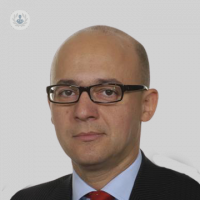What lifestyle changes can help manage endocrine diseases?
Written in association with:In one of our latest articles here below, distinguished consultant endocrine surgeon, Mr Radu Mihai, details the causes of endocrine diseases and how these kinds of conditions can affect one’s body.

What is an endocrine disorder and how does it affect the body?
For a surgeon, endocrine disorders refer to tumours and excessive function of the endocrine glands, or in other words, the source of hormone production in your body. In a more generic context, such disorders can be related to insufficient production of a hormone (e.g. hypothyroidism – lack of thyroid hormone production) or an impairment of the way the hormones act on the body.
Hormones are chemical messengers produced and released from highly specialised parts of the body – the endocrine glands. Hormones travel through the bloodstream to tissues and organs and impact on their function. They are vital to the normal development of children and the normal function of the body.
What are the common causes of endocrine diseases?
The environment impacts on the function of endocrine glands. The classic example is that a lack of iodine in food leads to an enlargement of the thyroid gland named goitre. Iodine concentrations are lower in areas with high altitude mountains and dietary iodine supplementation is beneficial to people leaving in such areas. There are, however, many patients with goitre who live in areas with sufficient iodine, and therefore most of the time the cause of a goitre remains obscure.
Some conditions run in families. For example, a set of diseases caused by an attack of ones’ own immune system on several endocrine glands is more common in members of the same family. Autoimmune thyroiditis, also called Hashimoto thyroiditis, is the most common example.
How is endocrine disease diagnosed and treated?
The most dramatic presentation is a change in the appearance of the body that creates clinical signs recognisable by a clinician. For example, excess cortisol production from the adrenal glands leads to specific distribution of excessive weight gain.
The most common scenario is a presentation with non-specific signs that have to be interpreted by the assessing doctor, most commonly a GP, relating to whether there is an organic cause or not. For example, severe tiredness can be caused by a lack of thyroid hormones or an excess of parathyroid hormone leading to high calcium levels, or an excess of cortisol leading to muscle wasting.
In modern medical practice, some of these conditions are picked up on routine blood tests before any convincing clinical signs develop.
Can endocrine diseases be hereditary or run in families?
One type of an adrenal tumour that produces too much adrenaline, phaeochromocytoma, can be caused in up to 40 per cent of patients by a genetic mutation. A rare type of cancer in the thyroid gland, called medullary thyroid cancer, runs in families in a quarter of cases.
Parathyroid tumours can also occur in families. Historically, the focus has been on a condition named MEN-1, but now more genes are now considered to run in families with a higher risk for this condition.
How is this tested?
Most of the time, the diagnosis is based on genetic screening. The patient at risk of having such a condition is seen by a geneticist who will explain the test and the implications of a positive test. If the patient agrees with the test, a small blood sample or a sample of saliva is collected.
What lifestyle changes can help manage endocrine diseases?
Reduced stress is expected to have a positive impact on the severity of immune conditions (such as Graves’ disease) but it is impossible to prescribe a strategy for reducing the daily stress in patients with such conditions.
At the other end of the spectrum, many plastic compounds, pesticides, and chemicals that surround us in our day-to-day lives have the potential to be endocrine disruptors.
To book an appointment with Mr Radu Mihai, head on over to his Top Doctors profile today.


